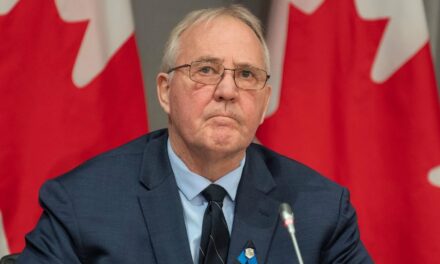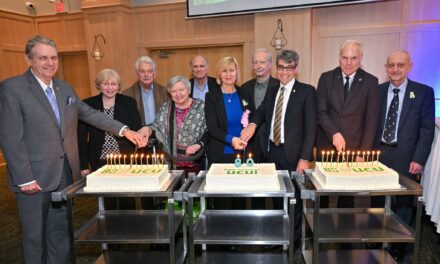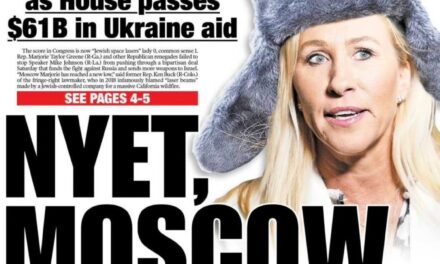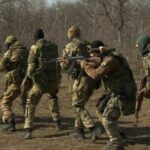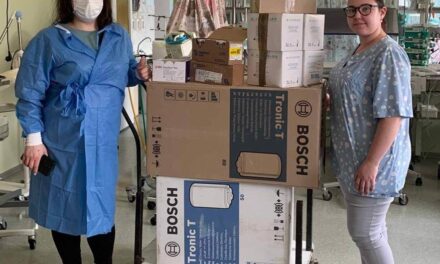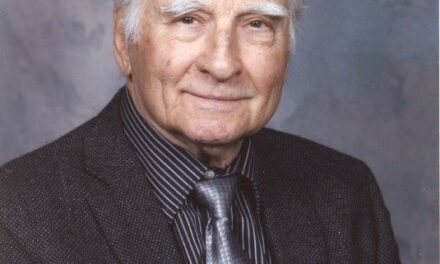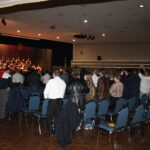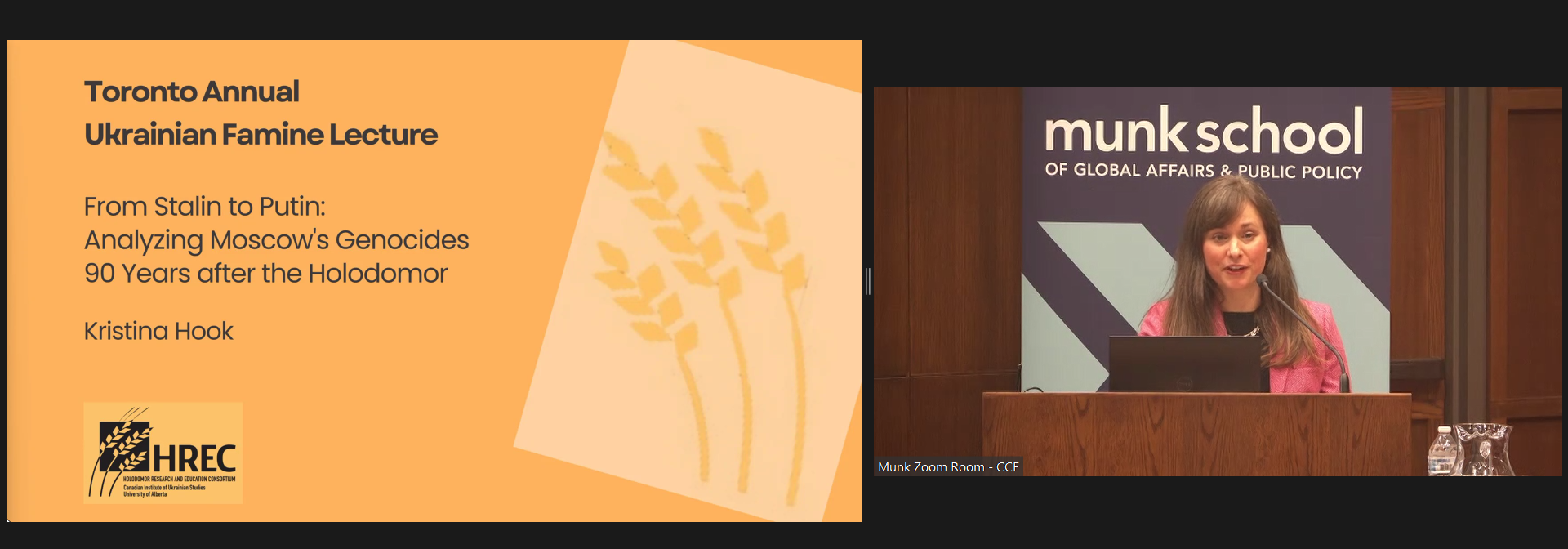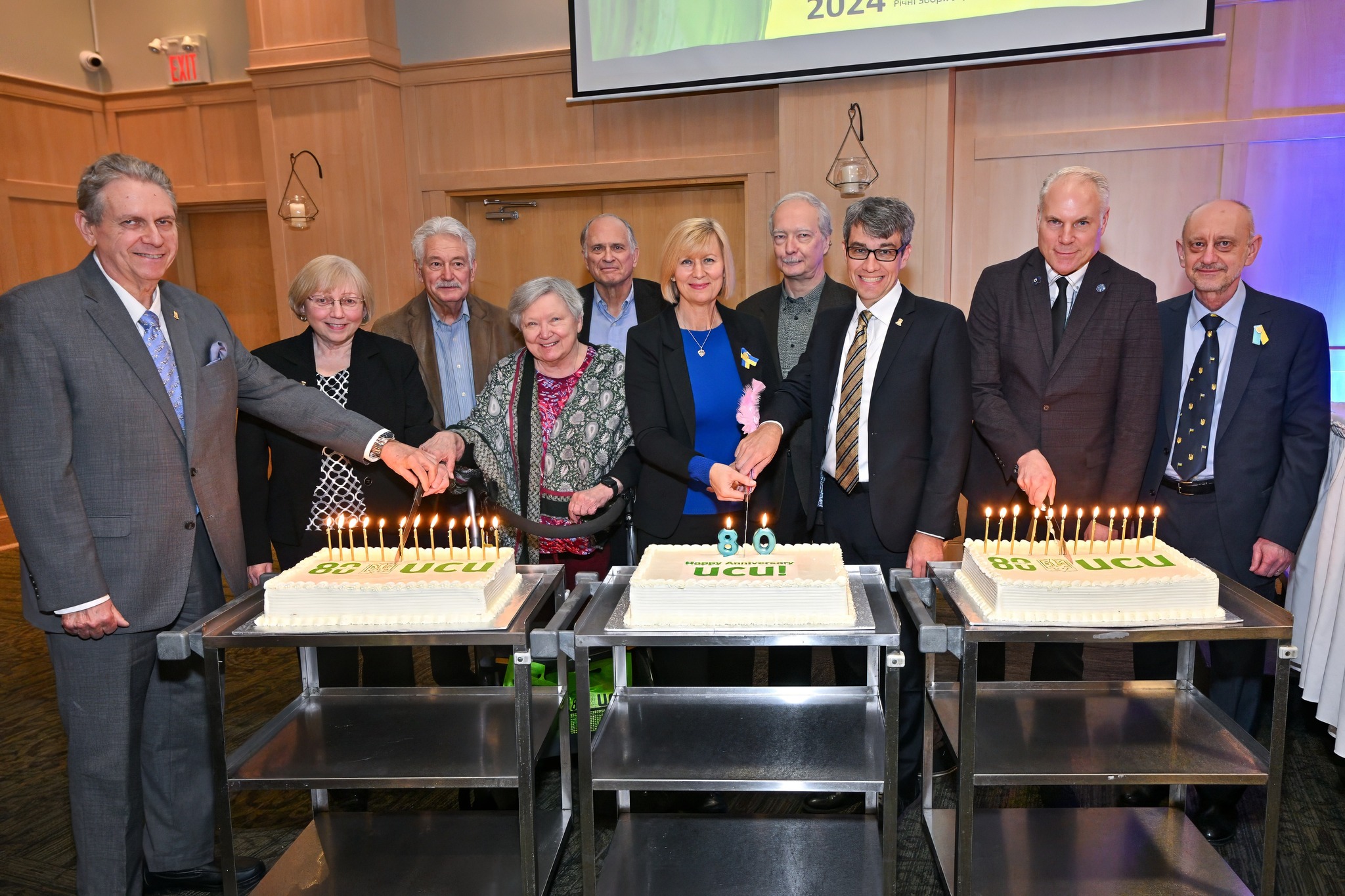Ulana Plawuszczak Pidzamecky.
Those who believe Moscow began its plan to annihilate Ukraine and erase Ukrainian identity in 2022 or even 2014 should read more about Sandarmokh, the Holodomor genocide, and other horrible crimes committed by the Russian Federation over the ages.
–Ukraine Foreign Affairs Minister Dmytro Kuleba
On the evening of November 6, the Munk School at the University of Toronto was host to an outstanding 2023 Toronto Annual Ukrainian Famine Lecture – “From Stalin to Putin: Analyzing Moscow’s Genocides 90 Years after the Holodomor,” organized by HREC – The Holodomor Research and Education Consortium (CIUS; University of Alberta). The well-attended event was a highly anticipated gathering, held in hybrid format for a diverse audience of scholars, students, community leaders, and engaged citizens, including students and faculty linked in through a watch event from the University of Alberta.
In her introductory remarks, HREC Executive Director Marta Baziuk observed that in the current war Russia has wrought upon Ukraine, Ukrainians are once again fighting for truth and their history. And Ukrainians everywhere join them in this effort, including HREC, which has been working in this very area since its establishment 10 years ago through a gift of The Temerty Foundation, with the goal of promoting research, study, and understanding of the Holodomor – the Soviet-instigated famine in Ukraine of 1932–33. HREC has nurtured and continues to foster the new field of Holodomor studies. Additionally, Marta acknowledged the important co-sponsorship of the Toronto Annual Ukrainian Famine Lecture by the Centre for European, Russian, and Eurasian Studies, the Petro Jacyk Program for the Study of Ukraine, both housed at the Munk School of Global Affairs & Public Policy (U of T), the Canadian Foundation for Ukrainian Studies, and St. Volodymyr Institute, as well as the Ukrainian Canadian Congress – Toronto Branch, a sponsor of the Lecture from its very beginning in 1998.
Before introducing the evening’s guest speaker, HREC Executive Committee Chair and Academic Advisor, Professor Frank Sysyn (director of the Peter Jacyk Centre for Ukrainian Historical Research at the Canadian Institute of Ukrainian Studies, professor in the Department of History and Classics at the University of Alberta, Director, Toronto CIUS Office, and editor in chief of the Hrushevsky Translation Project) welcomed the large turnout and shared some upcoming events. Reflecting on the past decade of HREC’s work, he noted that perhaps its most notable accomplishment has been attracting and furthering the careers of younger scholars. Alongside this future-oriented achievement has been creating and building the Consortium’s reputation as a research hub and encouraging and contributing to cross-disciplinary discourses related to genocide and the Holodomor. He drew attention to the latest publication of the CIUS Press, an important contribution to Holodomor scholarship presenting archival sources that in many cases are little known or completely unexplored: Documenting the Famine of 1932–33 in Ukraine – Archival Collections on the Holodomor Outside the Former Soviet Union (https://www.ciuspress.com/…/documenting-the-famine…/…).
The guest speaker this evening was Dr. Kristina Hook, esteemed Assistant Professor of Conflict Management at Kennesaw State University’s School of Conflict Management, Peacebuilding, and Development. She received her joint PhD in peace studies and anthropology from the University of Notre Dame’s Kroc Institute for International Peace Studies and Department of Anthropology. As an anthropologist and scholar-practitioner, Dr. Hook specializes in genocide and mass atrocity prevention, emerging technologies and disinformation, post-conflict reconstruction, and war-related environmental degradation. A specialist in Ukraine and Russia and a former Fulbright Scholar to Ukraine, Dr. Hook has worked in 25+ countries including across Eastern Europe, the Balkans, the Middle East, East Africa, Southeast Asia, and the Caribbean.
Dr. Hook is the principal author of “The Russian Federation’s Escalating Commission of Genocide in Ukraine: A Legal Analysis,” published in July 2023 by New Lines Institute and the Raoul Wallenberg Centre for Human Rights. Supported by the National Science Foundation, Fulbright, USAID, and other grants and fellowships, Dr. Hook is writing a book that discusses Joseph Stalin’s historical genocide against Ukraine (the Holodomor) and how modern leaders interpreted this history to predict both Russia’s modern genocidal war and Ukraine’s stunning resistance. This book draws from more than 8 years of research on the Russia-Ukraine war, including 2.5 years of fieldwork across 32 Ukrainian cities and towns. Her book is also based on her doctoral dissertation, which won the Kellogg Institute for International Studies Distinguished Dissertation in Democracy and Human Rights Award and was nominated for several other university and international awards.
Prior to her time in academia, Dr. Hook served as a policy advisor at the U.S. Department of State’s Bureau of Conflict and Stabilization Operations and as a political/economic officer in an embassy abroad. She received a U.S. Department of State Meritorious Honor Award for her work on preventing and responding to mass atrocities and was a 2013-2015 Presidential Management Fellow. She has also held leadership roles at several international development and conflict resolution non-governmental organizations. From 2020 to 2023, she served as a non-resident fellow at the Marine Corps University’s Krulak Center for Innovation and Future Warfare. Dr. Hook also regularly consults with government, multilateral, and human rights organizations. Presently, Dr. Hook is a non-resident senior fellow with the Atlantic Council’s Eurasia Center.
Dr. Hook explained that her lecture was in commemoration of the victims of the Holodomor on its momentous 90th anniversary, and also in recognition of the resilience of Ukrainians, both past and present. She paid special tribute to what Ukrainians have suffered as individuals, as well as collectively. Her thoughtful and compelling presentation considered the issue of how to grapple with what genocide actually is. She drew attention to the fact that genocide is a human behaviour (albeit the most extremely antisocial of such behaviours). Since Dr. Hook had begun interviewing Ukrainians still in 2015 in order to come to an understanding herself about the Holodomor in the context of genocide, she shared a particularly insightful remark by one interviewed individual, who, when asked what the Holodomor was to them, responded that it was when the Ukrainian world was destroyed. And this remark became part of her doctoral dissertation title. She spoke about the extreme social impacts of the Holodomor, of persecution of a people’s entire existence: identity, belongings, family members, relationships… everything and everyone making up their whole world. She added that this is exactly what is happening again through the war in Ukraine today.
Dr. Hook organized her talk around three questions: What is genocide—in law, policy, and research; Why has genocide erupted twice by Moscow against Ukraine, in only 90 years? And how can genocide studies help us understand the Holodomor and stop Russia today? She discussed the categories of Atrocity Crimes (war crimes, crimes against humanity, and genocide), their legal definitions, legislation, policy, and research about them, what they have in common, and what sets them apart. She emphasized that genocide involves both actions and intentions and is a crime with no statute of limitations, as stipulated in The Genocide Convention of 1948 ratified by an astounding 153 countries (including Russia). Dr. Hook remarked that this means that all these countries have actually taken steps to domesticate this law, which is a huge achievement. She described the scholarship and policies that have developed from this Convention, also giving rise to international criminal law and human rights legislation. Dr. Hook noted that the establishment of the Convention brought forward not only punishment for genocide, but its prevention. She noted that the term “genocide” has taken on important moral authority as a result of the heinous Holocaust and the prosecution of its perpetrators.
What has remained a challenge has been to translate these developments into research. Dr. Hook observed that at the core of the discourse has been a definitional debate, but that this has been important for bringing clarity to our understanding of genocide. Through this process, important areas of agreement regarding genocide have been identified, namely: Who is targeted? And, for what purpose? She added that the human evil of genocide requires strategy, coordination, and effort. All of this has informed her own study of the Holodomor. She remarked on the continuum of the ideology of destruction supported by hardened perpetrators at the top of their power (Stalin, Putin) for whom numbers play a vital role in the dastardly task of population control. For perpetrators at the top, the dynamic of destroying even the future possibility of a nation’s existence remains chillingly durable.
She proceeded to speak about four key lessons derived from her research: perpetrator logics, intentions, networks, and outcome. She spoke about the different levels of perpetration: direct perpetrators, organizers, authorizers, enablers, and bystanders. Both in the past and currently, central to perpetrator logic is treating people as resources (and conversely, as dispensable). This is also part of the logic of empire. As a result, societies, including modern Russian society, behave as what they know and do, without consideration. Hence, their willing participation in the forcible erasure of the identity and existence of others. Such whole-society groupthink reflects the magnitude of evil intentions and is evidenced in patterns of escalation and, related to them, new tropes (e.g., denazification, desatanization, and so on). All of this represents the systematization of destruction. Dr. Hook referenced Prof. Olga Andriewsky’s fundamental work in the area, which has described the period of the Holodomor as constituting a radical break in Ukrainian history and life, with many losses on many levels, resulting in a totalizing outcome. Today, the Russian Federation willfully and eerily invokes past narratives and distorts history once more in order to terrorize in a totalizing way, in the belief that it can get away with this, not only in Ukraine but elsewhere in the world.
Dr. Hook concluded her presentation with the hopeful remark that, be it the horrors of the past or those of today, victim groups do fight back and can achieve victory. As Ukraine surely will. When faced with genocide we must all become incensed activists, ever mindful of the commitments of the Genocide Convention.
Dr. Hook’s engaging and insightful lecture stimulated a host of valuable questions and the lively ensuing discussion capped off this memorable event. Some of the topics that arose from the discussion were:
• The crime of aggression, which hasn’t been prosecuted since Nuremburg. Dr. Hook explained that it is a leadership crime. Meanwhile, atrocity crimes are at the individual level. In each case, much work continues to be done around accountability.
• Genocide perpetrators are self-confident and therefore self-incriminators, which helps to infer their intentionality.
• The Russian nation must be understood to have and must itself understand its role in the perpetration of genocide on Ukraine; war is not a sole endeavour and requires broad participation, serving as an indictment of the perpetrating society.
• What might be the probability of Russia getting away with the crime of genocide in light of inter-governmental politics.
• Genocide involves cascading radicalization and moral reorientation whereby the perpetration becomes a deeply and disturbingly warped “ethical good.”
• Treating people as resources means dispossessing them of their dignity, rights, worth, and destiny as individuals.
• The importance of interdisciplinary research clusters to furthering understandings about genocide and of the Holodomor as a genocide.
• Young people are key to helping affected societies like Ukraine to rebuild and renew, just as the foundational thinkers about the concept of genocide began their important work during their student years – strength lies in the solidarity of activism.
• The difficult discussion of genocide and of the Holodomor in particular needs to be part of schooling, so that children and young people can develop informed positions, learn to speak up in the face of such crimes, to take action both as individuals and good citizens (*A wide array of HREC resources and programs is available to support education: https://education.holodomor.ca/).
Dr. Hook ended the discussion period with the statement that only once Ukraine is secured, safe, and free will a resolution to the conflict initiated by Russia be possible. However, this will require transformation – by means of a thorough examination of the deep historical dynamics beneath the conflict. She observed that court of law proceedings will not be enough. Like with the Holodomor, so, too, with Russia’s genocidal war on Ukraine today, there will need to be acceptance that it was and is about the total annihilation of a people, culture, and nation.
A full recording of this fascinating lecture will be available on the HREC YouTube channel shortly (please subscribe!): https://www.youtube.com/@hrecvideos/videos
Share on Social Media







